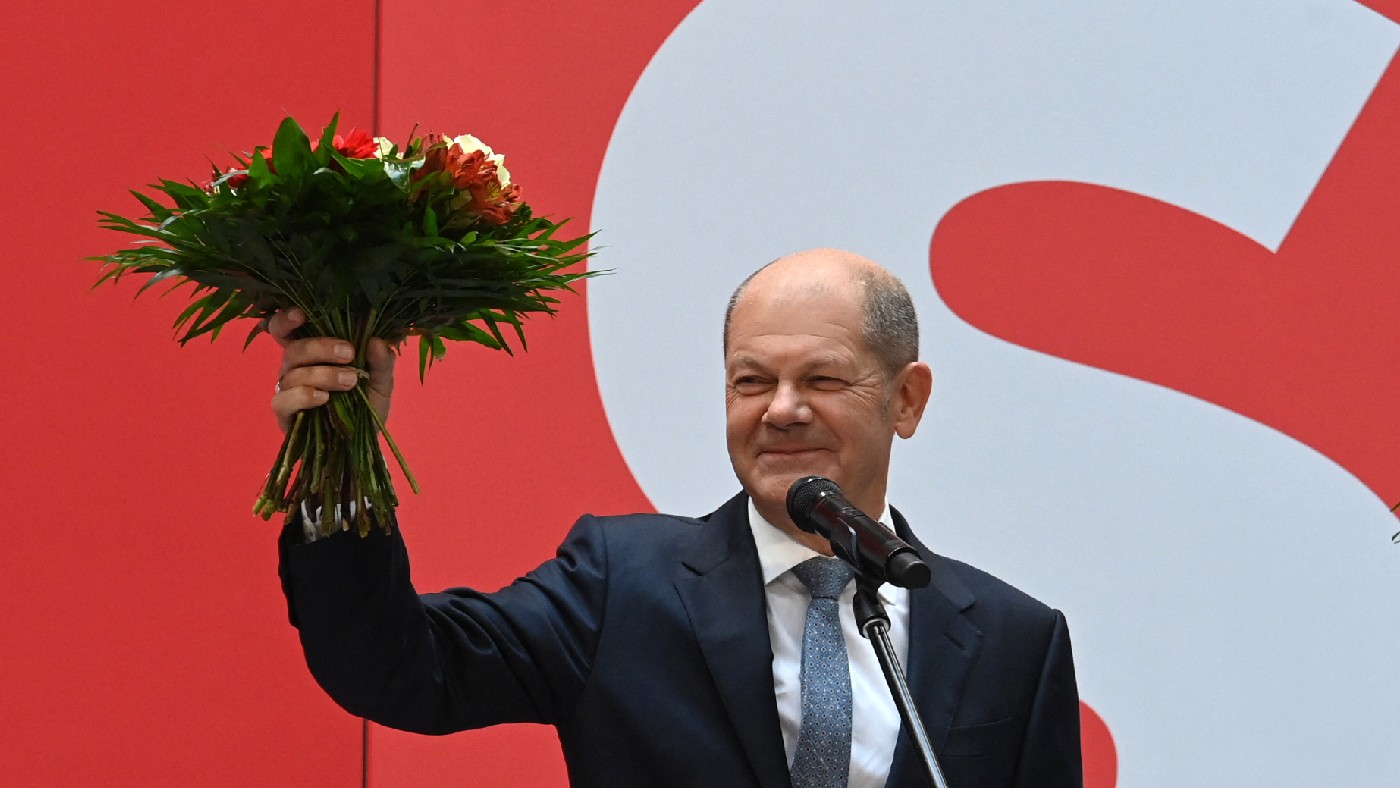Germany after Angela Merkel: the long negotiations begin
It could be a protracted wait to find out what form Germany’s next government will take

A free daily email with the biggest news stories of the day – and the best features from TheWeek.com
You are now subscribed
Your newsletter sign-up was successful
Will it be “traffic light”, “Jamaica”, or even another “GroKo”? That’s what Germans are asking about the make-up of their next government after knife-edge elections last week, said Der Spiegel (Hamburg).
In pole position to be chancellor is Olaf Scholz, whose centre-left Social Democrats (SPD) won 25.7% of the vote – the most of any party. He’ll hold talks with the Greens (who came third with 14.8%) and the free-market FDP (fourth, with 11.5%) over forming a “traffic light” coalition – a nod to the parties’ colours.
But if those talks fail, other scenarios arise. Armin Laschet, of Angela Merkel’s centre-right Christian Democratic Union (CDU), could lead a “Jamaica” coalition (black, green and yellow, like that country’s flag) with the Greens and FDP – despite his party winning its lowest-ever vote share (24.1%).
The Week
Escape your echo chamber. Get the facts behind the news, plus analysis from multiple perspectives.

Sign up for The Week's Free Newsletters
From our morning news briefing to a weekly Good News Newsletter, get the best of The Week delivered directly to your inbox.
From our morning news briefing to a weekly Good News Newsletter, get the best of The Week delivered directly to your inbox.
Or the two main parties could even repeat their “Grand Coalition” (GroKo) partnership of the last four years. Either way, “Germany’s democracy is in for a difficult, strenuous few weeks as the parties wrangle for power”.
One thing’s for sure, said Manuela Kasper-Claridge in Deutsche Welle (Bonn): after 16 years of Merkel, it’s clear that “Germany wants change”. The influence of the two main parties has waned while smaller parties have improved their standing.
But balancing their competing interests won’t be easy, said Thomas Sigmund in Handelsblatt (Düsseldorf). The Greens and the FDP have “huge rifts” over key policy areas. The Greens want to relax Germany’s strict borrowing rules to invest in going carbon neutral; the FDP opposes that and favours cutting taxes (which is a no-go for the Greens). Yet with a “GroKo” the alternative, neither party “can afford to fail” in the quest for common ground.
Just don’t expect them to find it soon, said Le Monde (Paris): after the last election, in 2017, a coalition took 172 days to emerge. Yet whatever form the government does finally take, it’s unlikely to be a huge departure from the status quo. Fringe parties like the far-right AfD and leftist Die Linke fared badly; the four best-performing parties are all centrist and favour EU integration.
A free daily email with the biggest news stories of the day – and the best features from TheWeek.com
Some see the SPD’s success as a “harbinger” of a revival of Europe’s centre-left, said Marc Santora and Melissa Eddy in The New York Times. That’s premature. Instead, what this poll shows is that personality trumps party loyalty for today’s voters. In Laschet, the CDU fielded a flawed, lacklustre candidate with an air of entitlement. That allowed Scholz, the current finance minister, to cast himself as the natural heir to Merkel – “despite being in another party”.
-
 What to know before filing your own taxes for the first time
What to know before filing your own taxes for the first timethe explainer Tackle this financial milestone with confidence
-
 The biggest box office flops of the 21st century
The biggest box office flops of the 21st centuryin depth Unnecessary remakes and turgid, expensive CGI-fests highlight this list of these most notorious box-office losers
-
 What are the best investments for beginners?
What are the best investments for beginners?The Explainer Stocks and ETFs and bonds, oh my
-
 The fall of the generals: China’s military purge
The fall of the generals: China’s military purgeIn the Spotlight Xi Jinping’s extraordinary removal of senior general proves that no-one is safe from anti-corruption drive that has investigated millions
-
 Epstein files topple law CEO, roil UK government
Epstein files topple law CEO, roil UK governmentSpeed Read Peter Mandelson, Britain’s former ambassador to the US, is caught up in the scandal
-
 Iran and US prepare to meet after skirmishes
Iran and US prepare to meet after skirmishesSpeed Read The incident comes amid heightened tensions in the Middle East
-
 Syria’s Kurds: abandoned by their US ally
Syria’s Kurds: abandoned by their US allyTalking Point Ahmed al-Sharaa’s lightning offensive against Syrian Kurdistan belies his promise to respect the country’s ethnic minorities
-
 Israel retrieves final hostage’s body from Gaza
Israel retrieves final hostage’s body from GazaSpeed Read The 24-year-old police officer was killed during the initial Hamas attack
-
 China’s Xi targets top general in growing purge
China’s Xi targets top general in growing purgeSpeed Read Zhang Youxia is being investigated over ‘grave violations’ of the law
-
 Panama and Canada are negotiating over a crucial copper mine
Panama and Canada are negotiating over a crucial copper mineIn the Spotlight Panama is set to make a final decision on the mine this summer
-
 Iran unleashes carnage on its own people
Iran unleashes carnage on its own peopleFeature Demonstrations began in late December as an economic protest